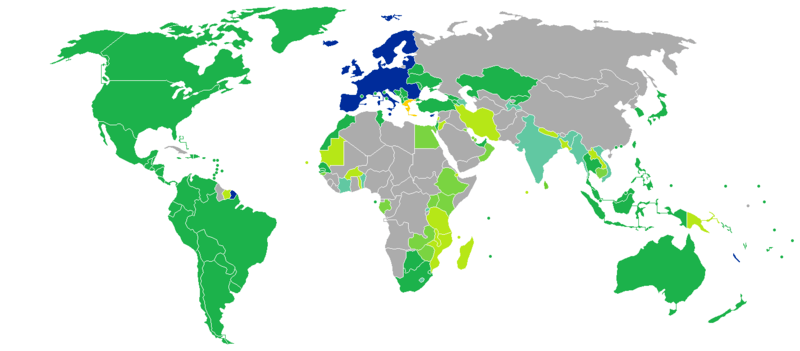Greek nationality law
| Greek Citizenship Act | |
|---|---|
 | |
| Parliament of Greece | |
| An Act relating to Greek citizenship | |
| Enacted by | Government of Greece |
| Status: Current legislation | |
Nationality law of Greece is based on the principle of jus sanguinis. Greek citizenship may be acquired by descent or through naturalization. Greek law permits dual citizenship. A Greek national is a citizen of the European Union, and therefore entitled to the same rights as other EU citizens.[1]
Naturalization
A child of a Greek citizen acquires Greek nationality automatically at birth. The same applies to children born in Greece whose parents have lived legally and permanently in Greece for five years. Children born abroad and whose parents have lived legally and permanently in Greece for five years become Greek citizens upon successful completion of elementary education (six years). Greeks born abroad may transmit citizenship to their children from generation to generation indefinitely.
An alien born out of wedlock is automatically Greek if the mother is Greek (see matrilineality). If the father is Greek and paternity can be proven (for example, through a paternity test), the child will become Greek when an application is submitted for the child to become a Greek citizen, providing the child has not yet reached the age of 18. An alien who is over 18 may become Greek by naturalization.
A child over 18 of a Greek father does not require naturalization if they can establish a chain of Greek citizenship through properly recorded birth and marriage certificates.
An ethnic Greek born outside of Greece may acquire Greek citizenship by naturalization if they fail to qualify for simple registration as the child of a Greek citizen. (This provision excludes Greek Cypriots, who may seek Cypriot citizenship instead.) The applicant must prove that at least one parent or grandparent was born a Greek national.
Naturalization requirements are different for ethnic Greek and non-ethnic Greek aliens:
- The alien ethnic Greek must make a declaration—in the presence of two witnesses, who must be Greek citizens—before the mayor or chairman of the village council where they live, which states they wish to be naturalized.
- The alien may submit this declaration to the Greek consul of their domicile, who transmits it to the Ministry of the Interior with a relevant report.
- An alien who is not an ethnic Greek must live in Greece for seven years before the declaration. They must also submit an application for naturalization to the Ministry of the Interior.
Children of a naturalized alien become Greeks if, at the time of completion of the naturalization proceedings, they are not married and are less than 18 years old.[2][3][4][5][6]
A panel of Council of State (Supreme Court) judges has ruled that the citizenship law as described above, which allows foreigners who legally reside in Greece to vote and stand in local elections, is unconstitutional as only Greeks should be allowed this right.
Marriage
At present, marriage does not entail the acquisition or loss of Greek nationality. Before 1984, a woman marrying a Greek national became Greek automatically.
Naturalization by military service or monasticism in Mount Athos
Ethnic Greeks accepted to the military academies for officers or non-commissioned officers of the Greek armed forces (according to the special law governing each school) or who enlist in the armed forces as volunteers (according to the law governing each branch) acquire Greek nationality automatically from the time they enter the academies or are enlisted. Moreover, according to the Greek constitution, aliens admitted as monks in one of the monasteries of Mount Athos, become Greek automatically.
Loss of citizenship
A Greek national does not usually lose their Greek citizenship when they obtain another nationality unless they specifically request it or in the rare case where a permit for citizenship was granted for by the Greek government to that citizen and they subsequently obtain the citizenship of another country.[7] A Greek citizen may voluntarily renounce citizenship by submitting an application to the Ministry of Interior in Athens.[8] For male Greek nationals, renunciation of citizenship is subject to the completion of their military duties.[9]
Although Greek citizens can acquire foreign nationality, some countries require citizens with foreign nationality to declare, at some point upon reaching adulthood, whether to keep their Greek or foreign nationality. For example, any dual Greek-Japanese citizen who, by birth, acquires the two nationalities, must choose, before reaching age 22, whether to keep the Greek or Japanese citizenship. The Japanese Minister of Justice may otherwise demand a declaration of choice of citizenship, to the dual Greek-Japanese national, at any time.
Dual citizenship
Greece allows its citizens to hold foreign citizenship in addition to their Greek citizenship. Some countries, however, do not permit multiple citizenship e.g. adults who acquired Greek and Japanese citizenship by birth must declare, to the latter's Ministry of Justice, before turning 22, which citizenship they want to keep.
Citizenship of the European Union
Because Greece forms part of the European Union, Greek citizens are also citizens of the European Union under European Union law and thus enjoy rights of free movement and have the right to vote in elections for the European Parliament.[10] When in a non-EU country where there is no Greek embassy, Greek citizens have the right to get consular protection from the embassy of any other EU country present in that country.[11][12] Greek citizens can live and work in any country within the EU as a result of the right of free movement and residence granted in Article 21 of the EU Treaty.[13]
Travel freedom of Greek citizens
Visa requirements for Greek citizens are administrative entry restrictions by the authorities of other states placed on citizens of Greece. In 2017, Greek citizens had visa-free or visa on arrival access to 171 countries and territories, ranking the Greek passport 6th in the world according to the Visa Restrictions Index.
In 2017, the Greek nationality is ranked twenty-first in Nationality Index (QNI). This index differs from the Visa Restrictions Index, which focuses on external factors including travel freedom. The QNI considers, in addition, to travel freedom on internal factors such as peace & stability, economic strength, and human development as well. [14]
References
- ↑ "Southern Europe's Immigration Test". Time. 18 February 2010. Retrieved 2012-05-30.
- ↑ "Citizenship law has minimal impact". Kathimerini. Retrieved 2012-05-03.
- ↑ "Citizenship up, ruling looms". Athens News. Retrieved 2012-05-03.
- ↑ "Court questions legality of citizenship law". Kathimerini. Retrieved 2012-05-03.
- ↑ "Turks of Western Thrace still struggling for rights, recognition". Today's Zaman. Archived from the original on 27 November 2011. Retrieved 3 May 2012.
- ↑ "How MIPEX was used to reform Greek citizenship laws". MIPEX. Retrieved 2012-05-03.
- ↑ "How To Become A Greek Citizen". Christos Iliopoulos.
- ↑ FEK 219/2004 article 18
- ↑ "Greek Nationality Code". Ministry of Justice.
- ↑ "Greece". European Union. Retrieved 4 May 2015.
- ↑ Article 20(2)(c) of the Treaty on the Functioning of the European Union.
- ↑ Rights abroad: Right to consular protection: a right to protection by the diplomatic or consular authorities of other Member States when in a non-EU Member State, if there are no diplomatic or consular authorities from the citizen's own state (Article 23): this is due to the fact that not all member states maintain embassies in every country in the world (14 countries have only one embassy from an EU state). Antigua and Barbuda (UK), Barbados (UK), Belize (UK), Central African Republic (France), Comoros (France), Gambia (UK), Guyana (UK), Liberia (Germany), Saint Vincent and the Grenadines (UK), San Marino (Italy), São Tomé and Príncipe (Portugal), Solomon Islands (UK), Timor-Leste (Portugal), Vanuatu (France)
- ↑ "Treaty on the Function of the European Union (consolidated version)" (PDF). Eur-lex.europa.eu. Retrieved 2015-07-10.
- ↑ "The 41 nationalities with the best quality of life". www.businessinsider.de. 2016-02-06. Retrieved 2018-09-10.
- Phaedon J. Kozyris, The American Journal of Comparative Law, Vol. 6, No. 4 (Autumn, 1957), pp. 600–602
